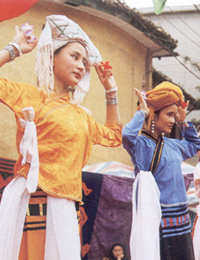 The Blang people mainly live in the Menghai and Jinghong counties in Xishuangbanna Dai Autonomous Prefecture in southwestern Yunnan Province, with a population of about 82,280 (as of 1990). Some are also scattered in the neighboring Lincang and Simao prefectures.
The Blang people mainly live in the Menghai and Jinghong counties in Xishuangbanna Dai Autonomous Prefecture in southwestern Yunnan Province, with a population of about 82,280 (as of 1990). Some are also scattered in the neighboring Lincang and Simao prefectures.
The Blang people have their own spoken language, which belongs to the Austroasiatic Phylum. Some of them can speak Chinese, Dai and Va languages. They have no written script and Chinese and Dai are widely used.
Records show that the ancestors of the Blang people can be traced back to the ancient Pu tribe who were believed to be the earliest people to settle in the Lancang and Nujiang river valleys. When the Yizhou County was established in the Yunnan Province during the Han Dynasty (206BC-220AD), the Pu people were brought under the control of the Han Empire. In the Tang and Song periods (618-1279), the Pu area was governed by the Nanzhao and Dali kingdoms, and the Pu people was called Puziman. In the following dynasties, it was named Puman and several other names. As a consequence of constant contact between the Pu tribe and the Han as well as their amalgamation into the Han state, these people gradually evolved into the present Blang group. After liberation in 1949, following consultation with the ethnic group, it was officially named the Blang ethnic minority.
Their main occupation is agriculture, planting upland rice, cotton and tea. The Blang Mountain is the native home of world-famous Pu'er tea.
The Blangs in Xishuangbanna area believed in Hinayana, as a result of the influence of the Dai tribe. They also have many things in common with Dai people, including the festivals. The major festivals include the New Year Festival, the Closing-door and Opening-door Festivals, and the Village God Worshipping Festival, etc.
The Blangs seek spouses outside their own clans and practice monogamy. The custom of living in the wife's family prevails. After wedding, some husbands live in the wives' family in their lifetime; but some only stay in for two or three years. In this period, a husband has meal and works in his own family, and only sleeps in his wife's family. After three years, when they have a child, they will make another wedding. In this manner, a husband can get his wife with him to his family.
The Blangs have their own special way to make tea. Every Blang woman is a tea-making expert. Every April to May, they fry the tender shoots until they get dry, and put them into capped bamboo tubes while they are still hot. Then, they roast the tubes by the hearth. When the bamboo skin gets scorched, the fine fragrant bamboo tube tea is made. They produce many other types of tea such as roasted tea, sour tea and powder tea, which are considered to be the premium tea for entertaining guests.
